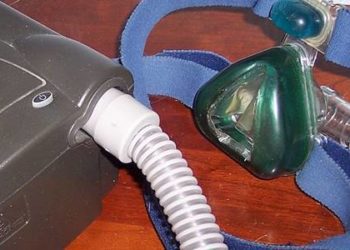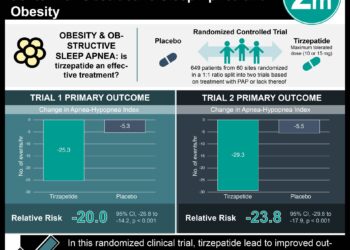Sleep disordered breathing linked to impaired cognitive function
1. In this meta-analysis of available studies, prospective data demonstrated that sleep-disordered breathing (SDB) is associated with an increased risk of developing cognitive impairment.
2. Analysis of cross-sectional studies indicate that SDB is linked to worse executive functioning scores on assessment; with no associated deficits in memory or global cognition.
Evidence Rating Level: 2 (Good)
Study Rundown: Sleep disordered breathing (SDB) is a common condition in older adults that has been linked to a number of chronic health conditions. Its association with poor health is of particular interest because it remains a treatable disease and thus a modifiable risk factor for many morbidity-causing conditions. Several studies have suggested a link between SDB and cognitive impairment but results have not been consistent. This is likely due to variations in diagnosis and evaluation of both SDB and cognitive impairment. The current study sought to systematically evaluate all studies that evaluated the link between SBD and cognitive functioning. Of the prospective studies analyzed, pooled analysis demonstrated that participants with SDB had an increased risk of developing cognitive impairment, but significant heterogeneity between studies existed. In evaluation of cross-sectional data, the presence of SDB was linked to impairment in executive functioning but not memory or global cognition.
The study identifies and clarifies a consistent link between SDB and impaired cognition, and provides motivation for further studies to clarify the exact mechanism of the connection and investigate the effect of treatment of SDM on preserving cognitive function. The strengths of this study included the systematic review design and evaluation for forms of bias. The main limitations of the study included the reliance on heterogeneous studies with variation in measurements for SDB and cognitive function. The paucity of data also limited the ability to evaluate for important covariates for cognitive function.
Click to read the study, published in JAMA Neurology
In-Depth [systematic review]: This study included all original articles reporting prospective or cross-sectional population based studies of older adults (mean age ≥40 years) that evaluated outcomes of cognitive impairment, Alzheimer’s disease, or dementia risk and defined SDB by apnea-hypopnea index (AHI) or clinical diagnosis. Pooled risk ratios were used to evaluate prospective studies while cross-sectional studies evaluated the standard mean difference on cognitive function test scores.
A total of 6 prospective studies demonstrated a 26% increased risk of cognitive impairment associated with SDB (risk ratio,1.26; 95%CI, 1.05-1.50). Removal of one outlier study increased this associated risk to 35% (risk ratio, 1.35; 95%CI, 1.11-1.65). In the analysis of 7 cross-sectional studies there was a link between SDB and executive function (standard mean difference, −0.05; 95%CI, −0.09 to 0.00), but there was no difference in global cognition or memory.
Image: PD
©2017 2 Minute Medicine, Inc. All rights reserved. No works may be reproduced without expressed written consent from 2 Minute Medicine, Inc. Inquire about licensing here. No article should be construed as medical advice and is not intended as such by the authors or by 2 Minute Medicine, Inc.









